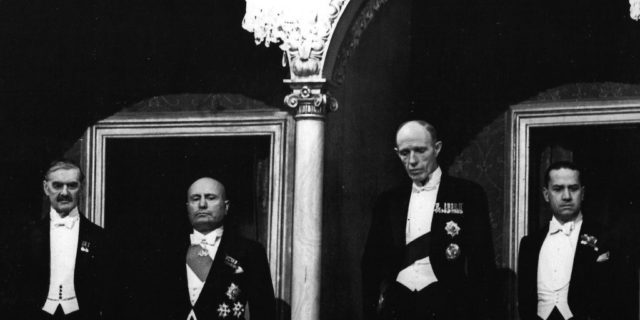
By
Bruce Strang
December 2020
Print Version
What you need to know
British and Italian representatives signed 8 agreements, commonly called the Easter Accords, on 16 April 1938. The various agreements aimed to settle all outstanding disputes between the two governments, and, on the surface, it appeared that both Powers had committed to observe the territorial status quo in the Mediterranean basin. Two years later, however, fascist Italy and Britain were at war.
Why this research is important
This research shows the difficulty for government leaders as they seek to reach durable international agreements. In this case, Benito Mussolini, the Italian dictator, and Neville Chamberlain, the British Prime Minister, both believed that an agreement would accomplish important goals. Chamberlain hoped that it could restore previous Anglo-Italian friendship, secure British control of the Mediterranean, create a lasting basis for peace, and lessen the dreadful strain that rearmament placed on the British recovery from the Great Depression. For his part, Mussolini had very different aims. He wanted to secure official British recognition of Italy’s conquest of Ethiopia, to split Britain from its potential French ally, and to cause a break within the British Cabinet. Mussolini had little interest in perpetual peace, and the accords represented the Duce’s manoeuvres to establish the best possible conditions for a war to restore much of the territory of the old Roman empire. These vastly divergent views of the world meant that the Easter Accords had little chance of creating a durable entente between the two powers.
How this research was conducted
Research in the Archivio Storico Diplomatico del Ministero degli Affari Esteri, the Archivio Centrale dello Stato, and the Archivio Ufficio Storico dello Stato Maggiore Esercito provided evidence of Italian foreign and domestic policy. Research in the British National Archives in Kew and in collections of Neville Chamberlain’s and Anthony Eden’s papers at the Cadbury Research Library at the University of Birmingham provided evidence of debates about policy in the British Cabinet. The digital revolution has made some British Cabinet and military planning documents available online, and diverse published works ranging from the diaries of Italian Foreign Minister Galeazzo Ciano to published historical monographs and articles rounded out the sources of research.
What the researcher found
The Italian government pursued limited tactical aims in pursuing these agreements. It wanted to make as few concessions as possible while securing official British recognition of the Italian defeat of Ethiopia’s military in 1936. It rejected any French participation in these accords, as the fascist government aimed to prepare the ground for a war to seize Tunisia, Corsica, Nice (Nizza), and parts of Savoy from France. Italy also targeted Anthony Eden, the British Foreign Secretary, as Italian diplomats feared that he sought to block Italy’s expansion in the Mediterranean, even at the risk of war in 1938. The Italian government did eventually secure British recognition of its victory in Ethiopia and did conspire with Chamberlain to orchestrate Anthony Eden’s resignation from the Cabinet in February 1938. Both sides in these negotiations practiced wishful thinking, however, and neither was able to gain tremendous advantage from the accords. Their views of the world diverged too dramatically; they could not reach a genuine meeting of the minds.
How this research can be used
This research will inform debates in history and political science about the failures to prevent war in the 1930s. It shows the dangers of wishful thinking among government leaders. It provides evidence that seemingly comprehensive accords or peace treaties can have such divergent interpretations by the various parties that the tightest pacts can nevertheless be doomed to fail. This research shows the vast intellectual gulf between those in the 1930s who pursued peace through conciliation and those who sought to expand their territory and resources through threats and violence.
About the Researcher
Keywords
- Anthony Eden
- Benito Mussolini
- Easter Accords
- Galeazzo Ciano
- international relations
- origins of World War Two
Publications Based on the Research
Strang, B. (in press). Mésentente Cordiale: Italian policy and the failure of the Easter Accords, 1937–1938. Diplomacy & Statecraft.
Editor: Christiane Ramsey
Read more BU Research
Research at Brandon University follows comprehensive policies designed to safeguard ethics, to ensure academic integrity, to protect human and animal welfare and to prevent conflicts of interest.

